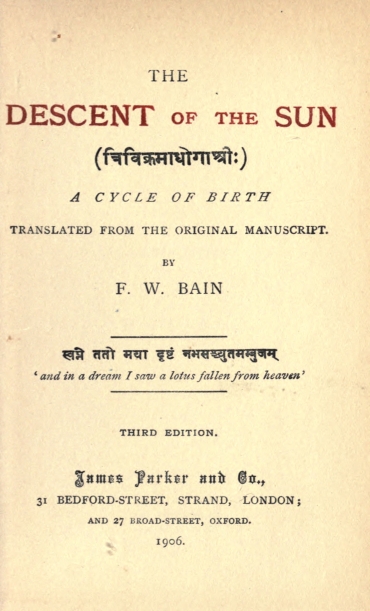THE DESCENT OF THE SUN.
[Sanskrit script]
(The illusion of a waking dream.)
Like a Digit of the Moon
In the Shadow of the Earth
Spirit undergoeth Swoon
In the Vestibule of Birth;
Dreameth transitory trouble,
Weareth Hues of Heaven, hurled
Hither, thither, as a Bubble
On the Ocean of the World.
[vide n. p. xv.]
THE
DESCENT OF THE SUN
[Sanskrit script]
A CYCLE OF BIRTH
TRANSLATED FROM THE ORIGINAL MANUSCRIPT.
BY
F. W. BAIN
[Sanskrit script]
'and in a dream I saw a lotus fallen from heaven'
THIRD EDITION.
James Parker and Co.,
31 BEDFORD-STREET, STRAND, LONDON;
AND 27 BROAD-STREET, OXFORD.
1906.
First Edition, 1903.
Second Edition, 1903.
Third Edition, 1906.
DEDICATED
TO
MARGARET.
INTRODUCTION.
Here is a fairy tale which I found in an old Hindoomanuscript.
As the title shows, it is a solar myth. Literallytranslated, its name is: The glory of the Going Down of theSun. But this is only the exoteric, physical envelopeof the inner, mystical meaning, which is: The DivineLustre[1] of the Descent (Incarnation) of Him Who tookThree Steps: i.e. Wishnu, or the Sun, the later Krishna,or Hindoo Apollo. And this epithet of the Sun isexplained by the well-known passage in the Rig-Weda(I. 22. 17[2]), 'Three steps did Wishnu stride: thrice didhe set down his foot.' A mythological expression forthe rise, the zenith, and the set of the Sun. But theold magnificent simplicity of the Rig-Weda wasperverted by subsequent Pauranik glosses; and Wishnu,according to the new legend, was said to have cheatedhis adversary, Bali, by striding, in his Dwarf Incarnation,over the three worlds. In our title, a differentturn is given to the old idea, which we may express bysaying that the steps commence, not with the rise,but the set of the Sun: his Going Down, his mysteriousperiod of Darkness, his Rising again. This is theinverted Race, or Cycle of the Sun, which so muchexercised the mind of primitive man, and seemed to bea symbol of the mystery of Birth and Death.
And ours is a strange story; which seemed to thetranslator not unworthy of being clothed in an English dress,containing as it did so much in little bulk that, as theFrench say, donne à penser. Absolutely Hindoo in itsform and spirit, it is for an Englishman full ofassociations, and instinct with that philosophical mythology,scraps and fragments of which are familiar to him inthe story of the Fall and the poetry of Milton, in manyan o

